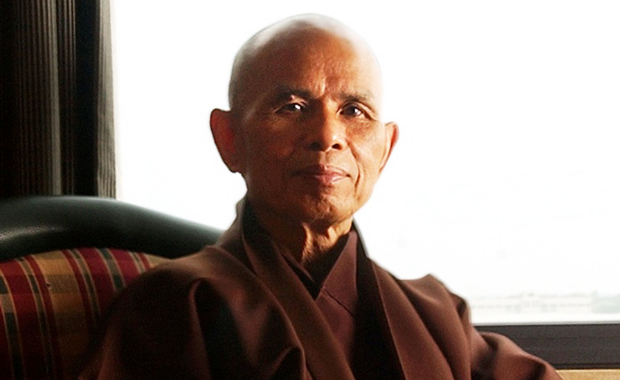Life
The Most Powerful Lessons Thich Nhat Hanh Taught Us

Thich Nhat Hanh was one of the most influential spiritual leaders on the planet. Revered for promoting peace and bringing mindfulness to the west. Even Dr Martin Luther King, Jr. called him “an apostle of peace and nonviolence”.
It’s no wonder then that there are mourners the world over after the recent passing of Thich Nhat Hanh.
Solace does come through the powerful lessons he leaves behind.
Live in the here and now
Living presently has become a buzzword of sorts in recent years. We all know we ought to live that way, but few of us truly understand mindfulness, let alone are able to cultivate it.
Hanh’s gentle approach to mindfulness reminds us that peace is always available.
As he said, “feelings come and go like clouds in a windy sky. Conscious breathing is my anchor.”
By thinking of our feelings, and our thoughts as passing clouds, we see them differently. We no longer have to believe every thought, nor allow ourselves to fall into the trap of obsessive thinking. Instead, we gain power and perspective when we separate ourselves from our feelings and let them come and go.
Let go of suffering: start living
To really live mindfully, Thich Nhat Hanh said that we must let go of our suffering. Unfortunately, many of us would prefer to continue suffering than to step into the unknown.
And Hanh knew a thing or two about suffering. After travelling from his home country Vietnam to the U.S. and Europe to oppose war, (something that led him to be nominated for Nobel Peace Prize) Hanh was exiled from Vietnam for 39 years. Instead of making him bitter, he remained peaceful and continued his work around the globe.
“People have a hard time letting go of their suffering,” said Hanh, “Out of a fear of the unknown, they prefer suffering that is familiar.”
Our worries, anxieties, fears and regrets might feel familiar – and therefore safe – but to free ourselves and live in the present moment, we must let them go.
It means being strong with ourselves. When negative thoughts arise, we must allow them to float away. And gently come back to the present moment.
Enjoy every day
In our current world of restrictions, case numbers, and variants, naturally, fears and anxieties arise. Enjoying every day might seem hard in time’s like these. Regardless, Hanh is adamant that we ought to enjoy not just every day, but every minute too.
“I promise myself that I will enjoy every minute of the day that is given me to live,” he said.
It’s worth remembering, our days are not guaranteed. Importantly, happiness is actually a choice we make each day. There is incredible power in knowing this. Just as we can let out thoughts pass by us, we can choose to enjoy every day regardless of our circumstances.
Silence is powerful
Our world is noisy. If we aren’t obsessively scrolling on our phones, we’re replying to emails, taking calls or streaming drama shows. Notifications come in from multiple sources every hour of every day. Switching off is something that gets increasingly difficult. Yet, silence may just be the key to improving our lives.
Hanh believed so strongly in the power of silence he authored a book on it – one that had a lasting impact on my life.
“Silence is essential,” he said. “We need silence just as much as we need air, just as much as plants need light. If our minds are crowded with words and thoughts, there is no space for us.”
Practising silence allows us to hear our inner world. Rather than distracting ourselves with continuous noise, silence has the power to give us inner peace, knowledge, and knowing.
It can power our decision making, improve our focus, and perhaps even had a positive impact on our mental health. And according to Hanh, because silence comes from within, we can cultivate silence even in the most chaotic of places.
Come back to your breath
If you know anything about mindfulness, you’ll have undoubtedly heard about coming back to your breath. But for Hanh, it was so much more than a meditation technique. Connecting with our breath is a way of life and an anchor for us to truly live in the present moment.
“Breath is the bridge which connects life to consciousness, which unites your body to your thoughts. Whenever your mind becomes scattered, use your breath as the means to take hold of your mind again,” he said.
It’s uncommon for most of us to even consider our breath on a daily basis, let alone use it as a way to calm our minds. Yet focussing on our breathing for just a few minutes can do wonders for relaxation, and mental clarity.
There is comfort in passing
Having now passed, Thich Nhat Hanh’s view of death feels more relevant than ever. In one of his books, No Death, No Fear he details that when his mother passed away he suffered for a year. Then, one evening, after having an intense dream about his mother, he decided to go outside and walk in the moonlight. As he walked he realised she had never truly left him – that was a concept his mind had created.
“From that moment on, the idea that I had lost my mother no longer existed. All I had to do was… feel the breeze on my face or the earth under my feet to remember that my mother is always with me, available at any time.”
In a world that fears death, Hanh’s thoughts are comforting. Perhaps one of the greatest teachers of mindfulness and peace hasn’t left us at all.
Life
Imposter Syndrome Is Rooted in Your Past But Here’s How You Can Rewire It
Imposter syndrome is most prevalent in highly successful women

Imposter syndrome is “the persistent inability to believe that one’s success is deserved or has been legitimately achieved as a result of one’s own efforts or skills.” (more…)
Life
The Surprising Mental Health Tool You Probably Haven’t Tried
Through journaling, I arrived at a more balanced perspective, it reinstated my sense of gratitude and led me to accept my disability

In two particularly difficult times in my adult life, my journaling practice is helping me heal emotionally. It has been a vital tool for helping me see the bigger picture and land in a place of gratitude. (more…)
Life
How to Stop Comparing Yourself to Others and Find True Happiness
Comparison is the thief of joy; it robs us of our happiness, self-esteem, and peace of mind

In today’s hyperconnected world, it’s easier than ever to fall into the trap of comparing ourselves to others. Social media platforms like Instagram, Facebook, and LinkedIn constantly bombard us with curated highlights of other people’s lives, making it seem like everyone else is happier, more successful, and more fulfilled than we are. (more…)
Life
Harness the ‘Battery Effect’ to Transform Life’s Tensions into Your Greatest Strength
Recharge your life batteries by shifting your mindset today

I believe our life capacity is determined by the skillsets we develop on this spinning rock we call Earth. By “life capacity,” I mean our ability to embrace and sustain joy. (more…)
-

 Did You Know4 weeks ago
Did You Know4 weeks ago7 Surprising Life Lessons Video Games Taught Me That School Never Did
-

 Success Advice4 weeks ago
Success Advice4 weeks agoHow Playing by the Rules Became the Smartest Business Strategy
-

 Success Advice3 weeks ago
Success Advice3 weeks agoHow to Build Trust, Kill Micromanagement, and Lead a Team That Thrives
-

 Success Advice3 weeks ago
Success Advice3 weeks agoSuccess Isn’t Sexy: 5 Daily Habits That Actually Work
-

 Scale Your Business3 weeks ago
Scale Your Business3 weeks agoHow to Build a Workplace People Actually Want to Show Up To
-

 Scale Your Business3 weeks ago
Scale Your Business3 weeks agoHow Smart Entrepreneurs Cut Financial Chaos in Half with One Simple Switch
-

 Success Advice3 weeks ago
Success Advice3 weeks agoBreaking the Bias: How Females Can Thrive In The Workplace in 2025
-

 Scale Your Business2 weeks ago
Scale Your Business2 weeks agoThis Is How Successful Entrepreneurs Manage Their Time Differently





























